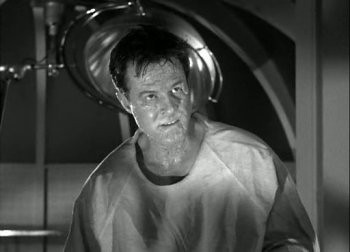 When the long-awaited movie version of Watchmen
When the long-awaited movie version of WatchmenHowever, that is an unfair and wholly inappropriate comparison - whereas the "threat that unites us all" serves as a final goal for Watchmen and Heroes, that concept drives the plot of "Architects of Fear".
(First, a little bit of a history lesson - if you think of The Outer Limits as a hipper, slightly more literate cousin of The Twilight Zone in the 1960s, you wouldn't be too far from the truth. Now, The Outer Limits is better known as a Showtime/SciFi channe
 l series, which is one of the few "revivals" that embraces the spirit of the original. But we're talking about the original 1960s series here).
l series, which is one of the few "revivals" that embraces the spirit of the original. But we're talking about the original 1960s series here).After a nuclear "near miss", the intelligensia of the world (much like Adrien Veidt) decide that there needs to be a "common threat", based on a captured alien (which - let's be honest - looks like a sock monkey with dramatic lighting). They will sacrifice one of their own, and the ballot is cast for Allen Leighton (Robert Culp) to undergo major surgery and become a Thetan. He, then, will become the "big bad" that will threaten - and then unite - humanity.
Much like Veidt in Watchmen, we see Leighton gradually losing his connections with humanity, mostly through his wife. His death faked, he is gradually losing his humanity - as he himself says at one point in the episode, he is "Caliban with a PhD" - a creature to be "afeared", but also knowing that sacrificing his humanity means possibly redeeming millions, averting a possible disaster. He realizes what he is losing, and unlike Veidt, struggles to retain some vestige of his former life. (Veidt, in contrast, removes everything that connects him to the world, including his trusted servants - and his genetically enhanced lynx. Even when Dr. Manhattan announces that he is so interested in humanity that he'll "create" some, Veidt seems more perturbed at not hearing Manhattan than at the chilling nature of that statement).
It would be easy to spoil the ending of "The Architects of Fear" - but it's a nice, almost perfect piece of 1960's science fiction television. (You can either rent the DVD set or use Netflix's "Watch Now" feature to view it). Of course, the movie will be forever linked with this episode, but there is one key difference:
One man becomes a monster; the other regains his humanity.

2 comments:
OL more literate than TZ? Not sure about that. Scarier, more SF, sure. Holds up better? Possibly.
Consider that, for TZ, Serling was writing about 75 - 80% of the episodes, with Matheson and Beaumont contributing about 10 - 15%.
OL had a greater diversity of writers, and the stories were a little bit more "adult" in terms of relationships.
That's my opinion, and I'm sticking to it.
Post a Comment